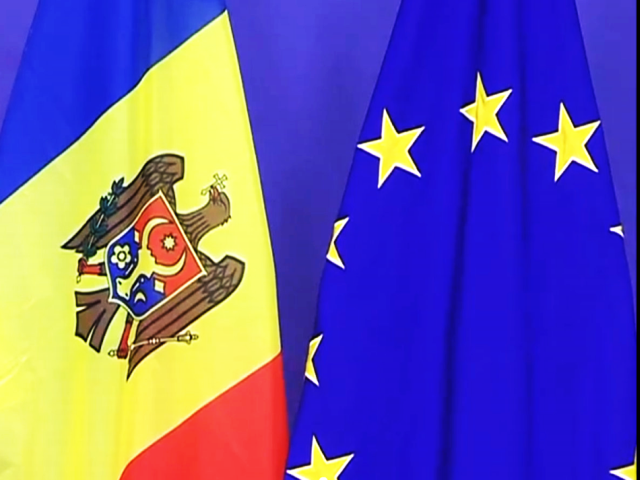Moldova and the European Union
An outlook on Moldova's European future.

Bogdan Matei, 06.03.2015, 13:44
Most analysts have termed the new government of the Republic of Moldova say about it that it is politically fragile and geopolitically confused. The minority cabinet led by young businessman Chiril Gaburici depends on support from the pro-Russian communists, which fuels uncertainties regarding Moldova’s European future. The government was sworn in as late as the second half of February, almost three months after the legislative elections of November, in which the electorate expressed a Western-oriented option.
After the vote, the scenario of continuity seemed already written. The three components of the openly pro-Western three-party government coalition, the Liberal Democrat, Democrat and Liberal Parties, grabbed 55 of the 101 seats in Parliament. The former governance, dominated by the pro-Russian communists, had ruled for 8 years, since 2009, and had proven corrupt and abusive against democracy. The Alliance for European Integration seemed doomed to continue in the same vein. In addition, the former Prime Minister and Foreign Minister Iurie Leanca, a Liberal Democrat who signed last year the Association and Free Trade agreements with Brussels, and promised to bring Moldova into the European fold in 2020, seemed the best suitable option for the position of head of government. However, the Liberals were unable to agree with the coalition partners, and in spite of their staunch support for European integration, they remained in opposition. The new Leanca cabinet created by the Liberal Democrats and the Democrats was rejected by parliament, and the Gaburici line-up needed the vote of communist deputies. In neighboring Romania, traditionally the most consistent and vocal supporter of Moldova’s European aspirations, the new president, Liberal Klaus Iohannis, did no hide his deception with the situation, and openly expressed his hope that Moldova should continue on its European track:
“I hope this government, with a young prime minister, an entrepreneur, will continue to take Moldova further towards the West. I believe that any responsible government realizes that, if a majority voted in favor of Europe and this possibility exists, that has to be the preferred direction in the future.”
The first reactions of the government and the foreign ministry in Bucharest were slightly contradictory. Prime Minister Victor Ponta hailed the appointment of the new government. The diplomats in Bucharest led by Bogdan Aurescu limited themselves to saying that they have taken note of the investiture. Analyst Robert Schwartz, head of the Romanian section at Deutsche Welle, did not hide his displeasure:
“What is happening now in Chisinau is a charade, typical of the political stage in Moldova — I can afford to say that clearly because the voters who went to the polls on November 30 in the parliamentary elections imagined something completely different. They voted for pro-European parties, and now Parliament swore in a new government with communist votes. It is a government challenged by civil society, and the European Union’s reaction seems to me symptomatic too, it is very reserved. The United States was not in a hurry either to salute what happened in Chisinau. What is interesting is also the fact that the Romanian Prime Minister Victor Ponta hailed saluted the new government and the new Prime Minister Gaburici. The foreign minister was much more reserved. Minister Aurescu knows much better what is going on, maybe even better than Prime Minister Ponta, when he simply took note, and did not jump quickly on the opportunity to salute developments there, because we can expect now a much more visible turn towards Moscow. In other words, Chisinau remains in a gray area, with a frozen conflict in Transdniestr, and a solution for the Europeanization of Moldova, I believe, is now more remote, after the new government takes office.”
Subsequently, Ponta himself said that he was not, in fact, happy with the situation in the Republic of Moldova, where there is a minority government dependent on the communists, recalling that in 2014 he worked great together with the Leanca cabinet, supported by all the three pro-European parties. Far from sharing his predecessor’s optimism, Prime Minister Gaburici warned that the Republic of Moldova, poor and poorly managed, undermined by corruption and political squabbles, is very far from living up to European standards:
“It is nonsensical to talk about European integration in a country rocked by many years of scandal, non-transparent privatizations, without the normalcy of the rule of law. All this talk about European perspectives is counterproductive rhetoric.”
What is certain is that the first foreign visit made by Gaburici was to Brussels. After meeting him, the EU High Representative for European Foreign Policy and Security, Federica Mogherini said that the new government in Chisinau was a sign that the country resumed its commitment to European principles. She said she was confident that the executive in Chisinau would step up its efforts to see through key reforms, especially in justice and finance, as well as in fighting corruption, to the best interest of all the citizens of the Republic of Moldova.






























